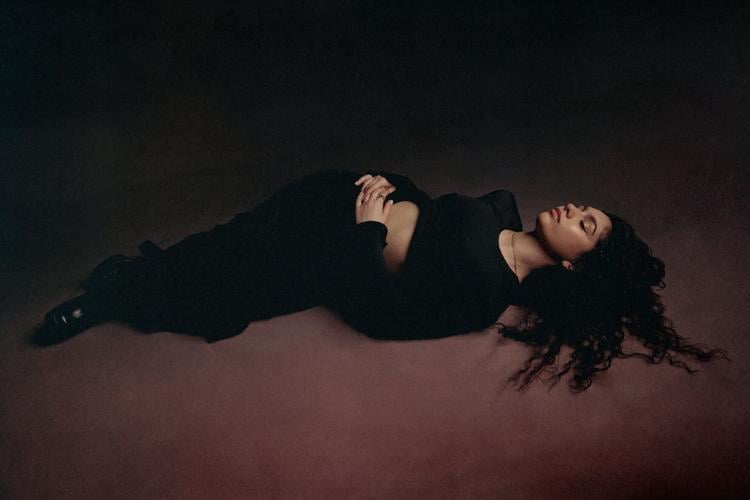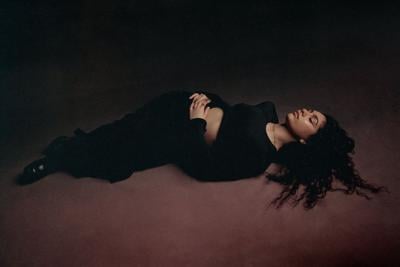“I didnÔÇÖt know how to write from a positive space,ÔÇŁ Alessia Cara told me during a Zoom call from her downtown ╔ź╔ź└▓ condo, as she discussed┬áher new album, ÔÇťLove & Hyperbole.ÔÇŁ
ÔÇťSongwriters donÔÇÖt need to vent when theyÔÇÖre happy. A lot of the time, the things that fuel us are not good. So, finding inspiration when you are happy and good is kind of challenging.ÔÇŁ
Especially when being heartbroken, sad and antsy has been a part of your brand since you were a teenager. Being a pop star was very different when the Brampton-born singer-songwriter, now 28, released her first album 10 years ago. Streaming was just taking off, radio still mattered, and TikTok wasn’t a thing. Artists like Cara leaned on their record labels for promotion, which often meant getting reduced to specific marketable characters: Miley Cyrus was the wild child, Iggy Azalea the stylish diva, Avril Lavigne the punk skater girl, and Cara the shy, awkward teen ÔÇö a label she has not quite shaken even as she approaches 30.

Since breaking out at 18, Alessia Cara has treated pop music like a diary, penning honest lyrics about her struggles with anxiety while remaining endearing.
Alex LoucasWith her introspective lyrics and soulful voice, on ÔÇťLove & HyperboleÔÇŁ Cara marks a new artistic chapter, one that balances the weight of being a pessimist and hopeless romantic with the excitement of new-found joy. For someone who built a career writing and singing about heartbreak and self-doubt, transitioning to themes of love and happiness was no easy feat.
“I wanted things to feel softer and more romantic,ÔÇŁ she said. ÔÇťThat’s the kind of world I want to live in for the time being.
“There is a stigma around songwriting, where suffering artists feel like we need to be in a state of pain to get good things. I wanted to break that because I was tired of being in a place of pain. I was in a place of pain so much in my personal life that I didn’t want to do that in my music anymore. It stopped feeling romantic, and it was just sad and miserable.”
The albumÔÇÖs title reflects Cara’s growth as an artist and person learning to embrace love without losing their emotional depth ÔÇö half self-deprecating exaggeration, half genuine exploration of romantic and platonic intimacy. It is a project she says walks a tightrope between positivity and vulnerability.
“My thesis for this album would be that, in life, we are able to accept and enjoy happiness because we know pain and loss,” she said. “I think we’re all a product of all those things that have hurt us, and we can actually use those things to find the beauty in life. It can be alchemized into something good.”

“There is a stigma around songwriting, where suffering artists feel like we need to be in a state of pain to get good things,” Alessia Cara said.┬á
Alex LoucasSitting in what appeared to be her living room, behind a chic glass coffee table, Cara was upbeat and personable during our conversation. Since breaking out at 18 with her debut album┬áÔÇťK▓ď┤ăĚ╔-▒§│┘-┤í▒˘▒˘,ÔÇŁ┬áfor which she won a best new artist Grammy, Cara has treated pop music like a diary, penning honest lyrics about her struggles with anxiety while remaining endearing. As someone who has followed her career since the beginning, this made talking to her feel familiar, as if I were catching up with an old friend.
Listening intently, her body leaning toward the camera, Cara discussed her new music with all the gleefulness, excitement ÔÇö and slight nervousness ÔÇö of a debuting artist, rather than a jaded multi-platinum veteran.
“I really tried to map the songs out in a way that felt like there was a beginning, middle and end ÔÇö starting with the first song, ‘Outside,’ which is literally about not being able to go outside, feeling closed off emotionally and physically and just being in a rut,” Cara said. “By the time you get to ‘Clearly’ (the final song), it is from a place of complete openness, understanding and forgiveness of yourself. Even sonically, ‘Outside’ feels tight and closed off, and ‘Clearly’ is vast and open.”
In addition to expanding her songwriting focus, on ÔÇťLove & HyperboleÔÇŁ Cara also broadened the scope of her production. In the studio with such producers as Mike Elizondo ÔÇö best known for his work with 50 Cent, Eminem and Gwen Stefani ÔÇö most of the tracks were performed live by the musicians in the room with her as she sang, which she said allowed her to loosen up while recording.
“It was very new for me, but I really wanted to do the real thing,” Cara said. “It opened me up to improvising more and not being as shy to jam out and sing something that might be stupid in the hopes of getting to something cool.”
Like “Night Time Thing,” a sultry track featuring a whimsical string section and a catchy chorus, which Cara said she wrote while trying to channel Doja Cat.

Alessia Cara performs at the Danforth Music Hall in 2016.
Lucas Oleniuk ╔ź╔ź└▓ Star file photoWhat hasnÔÇÖt changed, however, is CaraÔÇÖs reluctance toward a certain kind of collaboration. As with her last two records ÔÇö and unlike so many current pop albums ÔÇö ÔÇťLove & HyperboleÔÇŁ has zero features, and Cara wrote (or co-wrote) all the tracks.
ÔÇťIt just kind of happened that way. I wasn’t really thinking about it,ÔÇŁ Cara said.
ÔÇťWe live in a very feature-heavy world right now, where I feel like people want people on their song to ride coattails and make a song bigger. I am not knocking that; I love to indulge in features as a music fan. But I never want to do it for that reason. I am very particular; if I am going to have somebody on a song, or if I am going to get on (someone elseÔÇÖs) song, I feel like it has to make sense sonically.
ÔÇťI am just a very shy person, to be quite honest, and it is hard for me to put myself out there and ask people to do things,ÔÇŁ she continued in a bit of an anxious ramble. ÔÇťThere are many times where I felt this person would be so good on the song, and I thought it made sense, but I was too scared to ask. IÔÇÖm working on getting that out of my system.ÔÇŁ

Alessia Cara performs at the NHL Heritage Classic game at Hamilton’s Tim Hortons Field in 2022.
Cathie Coward The Hamilton SpectatorEven in its moments of pessimism and self-reflection, ÔÇťLove & HyperboleÔÇŁ sounds grounded and playful in a way that CaraÔÇÖs music previously hasn’t. This shift may be attributed to the sense of normalcy she found during the three years she worked on it. Much of that time, she said, was spent at home in ╔ź╔ź└▓, walking her dog ÔÇö a mini goldendoodle she got during the pandemic ÔÇö listening to podcasts, making dinner and indulging in life away from the demands of celebrity.
Intrigued by the albumÔÇÖs title, I asked Cara which aspects of life she was still being overly dramatic about and what she had learned to approach with more chill.
“I struggle a lot with change and the fact that time goes by really fast,” she answered. “Not to get too serious, but I have a really intense fear of dying and getting old. I think I take that a bit too serious. I need to be more chill about everyday life. Yes, everything is impermanent, but you have to stay present and enjoy it.”
On the other hand, Cara said she had learned to be more relaxed about her career. “I think it is important to have goals still and not be like, ‘Well, I have done it all,’” she said. “I try to have goals, but not hold them as the Bible, and understand that if those things don’t happen, it is not the end of the world. There is a balance where you can strive for things and be ambitious but not make it your be-all and end-all.
“I just want to keep having fun and explore new avenues. I would love to act and maybe write for TV and movies. I want to explore other aspects of creativity that aren’t music,ÔÇŁ she said, before adding with a huge smile, ÔÇťI think that would be kind of fun.ÔÇŁ



































To join the conversation set a first and last name in your user profile.
Sign in or register for free to join the Conversation